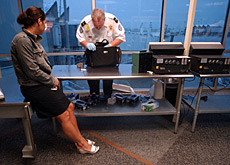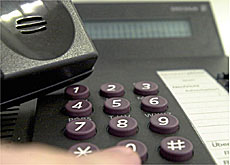Anti-terror phone tap plan to continue

The government has decided to push ahead with its controversial anti-terrorism plan giving the federal police wider powers that include measures such as phone tapping.
Justice Minister Christoph Blocher said on Wednesday that the cabinet believed the terror threat was still real enough to maintain the project despite criticism that it intrudes too much into the private sphere.
The government wants to change the law to allow the Swiss secret services to be able to carry out communications surveillance – correspondence, telephone and email – and observe private areas such as hotel rooms, if necessary by installing bugging devices.
Blocher promised that these measures – which were put forward last year for consultation – would only concern cases that dealt with terrorism, weapons of mass destruction and spying.
They would only be taken as a last resort and their legality checked beforehand.
The government said it wanted to stick to its original plan despite criticism from the right and the left.
“We are keeping to these measures because the danger has not lessened,” Blocher said in the Swiss capital, Bern, adding that if there had been an attack on Switzerland, everyone would be in favour of the plan.
He dismissed fears that the measures would be too intrusive. “Switzerland respects the rule of law to the extreme and will keep doing so,” said the minister.
Blocher added that the secret services would be active but not as much as in other countries.
Objections
The justice minister said he was not surprised by the results of the consultation, which saw the left and Blocher’s own rightwing Swiss People’s Party object to the revision on civil liberties grounds.
On the left, many politicians still have in mind the secret files scandal in 1989 during which it was revealed that the government had been keeping tabs on hundreds of thousands of people and organisations, believed to be on the left of the political spectrum.
The Swiss Federal Data Protection Commissioner, Hanspeter Thür, said on Wednesday that he also had concerns.
For him the proposals were, “dangerous because eavesdropping on citizens within their private sphere could take place without any criminal allegations”. Current legislation is sufficient, says Thür.
For their part, the centre-right parties and cantons have accepted the changes for security reasons, but with reservations.
Defending the law, Blocher said the government had changed its position slightly but that it was not possible to compromise on security questions. He said those in charge of security believed telephone tapping to be necessary.
Responding to criticism that the term “terrorism” was not defined in the law, Blocher said that there was not even a definition available at international level. He added that the term had changed over the years and was likely to continue to do so in the future.
The proposal will now be discussed in parliament.
swissinfo with agencies
In 1989 revelations that the government and police had been secretly keeping tabs on some citizens shook public opinion.
A parliamentary enquiry found that the authorities had been keeping files on hundreds of thousands of people and organisations – estimates run as high as 900,000. The official reason for this was protection of the country from “subversive activities” linked to communism.
Since 1992 police work has been under the watchful eye of a parliamentary commission.
The files are still stored in the federal archives – 300,000 people have so far asked to see them.
Telephone surveillance is strictly controlled in many countries to safeguard individual privacy.
Phone tapping often needs to be authorised by a court, and is normally only approved if less intrusive methods are not available.
Illegal or unauthorised phone surveillance is often considered a criminal offence. However, in some countries, such as Germany, courts will accept illegally recorded phone calls as evidence.
In the United States, federal agencies may be authorised to engage in phone tapping by a court with secret proceedings.

In compliance with the JTI standards
More: SWI swissinfo.ch certified by the Journalism Trust Initiative











You can find an overview of ongoing debates with our journalists here . Please join us!
If you want to start a conversation about a topic raised in this article or want to report factual errors, email us at english@swissinfo.ch.